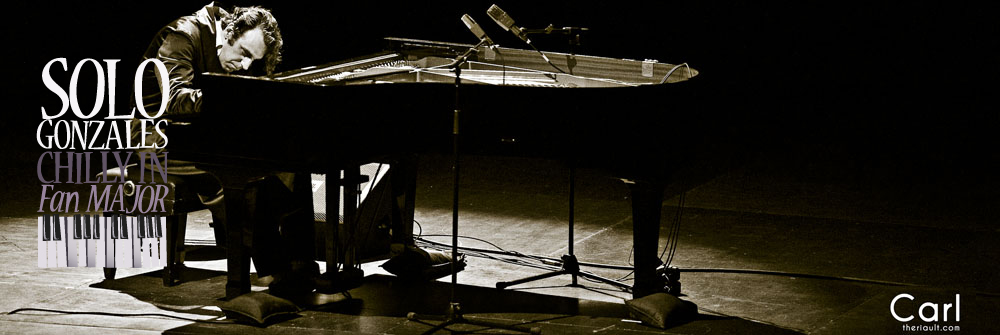 It shouldn’t come as a surprise that Gonzales is garnering attention and accolades in Germany, after all, he’s currently based out of Cologne and performs many concerts around the country. The same was true when he lived in Berlin, then Paris: Gonzales’ popularity in Germany and France increased dramatically while he was a resident. But the cities also had an effect on Gonzales in the same way that living in different cities affected the musical style of classical composers. He explored rap and electro while in Berlin, then impressionist and French pop music (old and new) while in Paris. His latest home in Cologne on the surface seems to be a strange choice, as it’s not especially well-known for either classical or electronic music. Still, with the composition and performance of “The Shadow”, and upcoming performances in the Cologne Philharmonic (with the Kaiser Quartett and Jarvis Cocker), Gonzales’ musical style appears to be shifting.
It shouldn’t come as a surprise that Gonzales is garnering attention and accolades in Germany, after all, he’s currently based out of Cologne and performs many concerts around the country. The same was true when he lived in Berlin, then Paris: Gonzales’ popularity in Germany and France increased dramatically while he was a resident. But the cities also had an effect on Gonzales in the same way that living in different cities affected the musical style of classical composers. He explored rap and electro while in Berlin, then impressionist and French pop music (old and new) while in Paris. His latest home in Cologne on the surface seems to be a strange choice, as it’s not especially well-known for either classical or electronic music. Still, with the composition and performance of “The Shadow”, and upcoming performances in the Cologne Philharmonic (with the Kaiser Quartett and Jarvis Cocker), Gonzales’ musical style appears to be shifting.
Recently, Gonzales tweeted an interview by Andreas Fasel of Die Welt (The World):
Deutschies! http://t.co/6OYHytwwOl
— chilly gonzales (@chillygonzales) November 18, 2014
Written for a German audience, the article uncovers a few new (and old) concepts and thoughts that deserve a closer look.
The article starts off describing Gonzales demonstrating the corollaries between piano and electronic music at an electronic music festival; likely the Electronic Beats Festival in Graz (29 May 2013):
The interview takes place at the Kölner Philharmonie, where Gonzales will play two nights on December 28th and 29th. After some interesting background on Gonzales’ route from Canada to Cologne (and his influential grandfather’s previous route from war-torn Hungary to Canada), Gonzales describes a stylistic simile:
“Musical styles are like countries,” says Gonzales, one must travel through it all, not finding that one or another is better. “All music is equal”, which is a fundamental law in Gonzales’ cosmos. He aspires to a “humanistic approach to music”, he says. “There is no …,” Gonzales begins the sentence in English and finishes in German: “… border” – there is no limit in music.
Cologne, while not being overly musically influential, may also provide the space and time for Gonzales to survey and absorb the musical history that surrounds him. Centrally located, Cologne provides easy access to many European nations. It’s possible that instead of being influenced by a particular city or musical style, Gonzales’ current location makes him in essence ‘borderless’. From Cologne, he is able to weave musical styles from France and Germany, Russia and England, and so on, as elegantly as he has been able to create a musical cloth woven with French and North American fabric.
The interview was originally published in German and the snippet above was machine translated to English, which tends to leave a lot of sentiment out of the translated text. Gonzales is eschewing machine translation and learning the musical language of classical musicians firsthand in order to not only capture sentiment without a loss in translation, but also to effectively incorporate his past musical ‘language’ to create new and wonderful music. Emotional impact is all too absent in today’s musical ‘hits’. It’s difficult to speak with deep musical emotion unless one appreciates the language, customs, and culture of what amounts to hundreds of years of European musical history. But ‘classical’ is a foreign language to most North Americans, which means that you need a unique musical polyglot and translator such as Gonzales to speak to everyone in an emotional, wordless language that everyone can appreciate and understand.
The trains that effortlessly travel between European nations transport Gonzales from one country to another within hours. Along the way he may even travel the same paths that took Mozart, Brahms, Beethoven, Bach, Chopin, Liszt, and countless other musicians between countries and cities – all in an unending quest to expand their musical universe – to move beyond their own physical and mental borders and to invent new and wonderful music for generations to enjoy. Gonzales’ grandfather may have been a ‘euro-music snob’, but he experienced the limitations that borders and inequality place on humanity firsthand. He saw how at one point in history, borders tore Europe and families apart. Gonzales’ universal humanistic approach to music eliminates borders and brings people closer together by speaking the beautiful language that is inherent in everyone.
